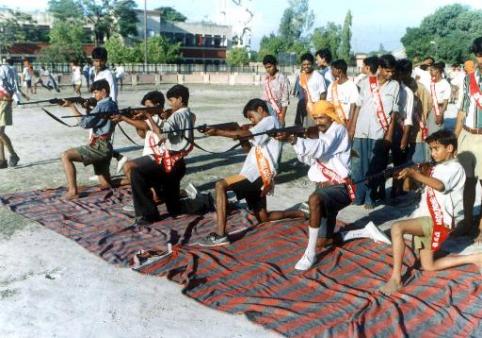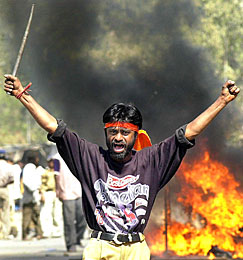-
Posts
1,898 -
Joined
-
Last visited
Content Type
Profiles
Calendar
Forums
Posts posted by wjkk wjkf
-
-
look how organised they are - and this is 7 years ago...
0 -
what's the point in khalistan if core issues are left unsorted....sort the issues and khalistan will be yours...
0 -
I kinda understand what you mean bhenji...it's a bit of a dilemma...I think the first and easiest place to start would be our own homes. I mean, I know for a fact that I'm not the only one here whose siblings and parents or other relatives or friends are starting (or have started) to slip down a very slippery slope away from Sikhi and Guru Ji...
I suppose a start would be just to do some paath (with them) everyday, or start a group up at gurudwara , and try and go through what you learn...ie. what are the meanings behind the shabds you read etc.?
That way as a group, youths and even elders would be more inclined to learn, want to join in, find out what is sikhi about - because from these meetings, people will discuss wider issues/topics in sikhi...so it becomes more like a forum... if you will
lol dunno how to explain :rolleyes:
0 -
where will those recordings be up? and also is there any recordings of his asa di vaar?
0 -
that is the most annoooooyin thing ever....
makes me cringe...
someone did that with my fruit the other day i was like :o
ended up giving her the whole bowl...
0 -
finding nemo
lol it's cos your from 'sydney!'
0 -
^^original
 0
0 -
really good site - get some ideas lol
before you start I know it focusses on Gujarat but we tend to focus on Punjab and Delhi too

also see this:
0 -
waheguruuuuu!!!!!!!!! That makes life soooo much easier
0 -
-
what?
0 -
The Joy & Challenges of Being a Sikh Woman
News Source: www.sikhchic.com
Having been born into a family of another faith, my spiritual journey along the path of Sikhism obviously did not begin along with my very first steps.
Growing up in New York City, I learned that the turbanned and bearded gentlemen I saw with increasing frequency were followers of a unique religion called Sikhi (as Sikhism is often referred to by its adherents) - a faith that arose during the 15th century in the Punjab region of India - and not Hindus or Muslims.
But I certainly never imagined that, a few decades later, in my mid-40s, I would joyously embrace Sikhi and become one of the 25 million members of the Sikh faith, the world's fifth largest religion.
My "date with destiny" arrived quite unannounced one evening via the Internet, during research I was doing on a topic of interfaith significance. My initial reaction to Sikhi was absolute love at first sight; I felt instantly magnetized, both intellectually and emotionally.
As I began to insatiably devour everything I could find about Sikhi, I was entranced to encounter it not as an esoteric conglomeration of rigid do's-and-don'ts, but a vibrant spiritual path, universal and timeless.
Like Judaism, Christianity and Islam, Sikhi is a totally monotheistic religion.
The three pillars of the Sikh faith - always keeping God in one's mind and heart, earning an honest livelihood, and sharing one's resources with all those in need - struck me as a simple, rational and relevant "blueprint for everyday life" as an actively engaged, fully contributing member of contemporary society.
The fundamental teachings that Waheguru (as Sikhs refer to God) is an all-pervading Deity, not one limited to any creed, nation, race, color or gender, and that human life is a unique opportunity to discover and nurture the Divine Light residing within all Creation, tremendously appealed to me. I also found the emphasis placed on performing selfless volunteer service quite compelling.
Among the many amazingly revolutionary precepts put forth by Guru Nanak, the founder of the faith, and reinforced by the nine Gurus that succeeded him, was the concept of complete gender equality. As a woman, I derived enormous satisfaction from learning that Sikhi accords both sexes the exact same status before God, as well as equal access to scriptures and to positions of Sikh religious and political authority.
As my nascent attraction ripened into a life-altering spiritual quest, I began delving into the exquisite poetic text of Guru Granth Sahib, the compilation of sacred writings imbued with the status of a living, eternal Guru by the tenth and last human Guru, Guru Gobind Singh, in 1708.
Exploring these soul-captivating scriptures and trying to incorporate their teachings into my life connected me with the Divine like never before.
I knew then that I had arrived at one of those "points of no return" that occur so infrequently over a lifetime: my journey of becoming a Sikh had begun.
In order for my bond to be more than just a private, internal one, I knew a solemn, public commitment was necessary. My desire to become a legitimate, recognizable member of the Sikh people, inextricably linked to its history and heritage, finally came to fruition one April morning.
With Waheguru's Grace, on the day before Vaisakhi, a holiday that commemorates the 1699 founding of the Sikh nation by Guru Gobind Singh, I was formally initiated into my chosen faith.
While the joys of being a Sikh woman are many, so are the challenges. Here are just a few examples.
Celebrating the Gurus' gift of complete gender equality entails being vigilant against any forms of discrimination or other encroachment upon women's rights, whether stemming from the mores of the traditional Punjabi or the Indian sub-continental culture in which Sikhi arose, or elsewhere.
Finding ways to effectively educate the public-at-large about Sikhi and Sikhs' distinctive physical appearance is essential to countering the misinformation and intolerance leading to bullying of Sikh schoolchildren and cases of mistaken identity, which, especially after 9/11 (turban-wearing Sikhs being equated with terrorists), have had violent, even deadly consequences.
Following the lifestyle of a committed Sikh includes regarding the body as a Divine creation and keeping all hair fully intact, requiring acceptance of concepts of beauty that do not always conform to society's notions of femininity.
Embodying the power, grace and dignity inherent in the name given to all Sikh females - Kaur, meaning "princess" - is a challenge we Sikh women successfully face every day.
I feel truly blessed to be one!
[Manjyot Kaur is the Assistant Editor and a regular columnist for the online magazine sikhchic.com. Besides appearing on this and other Sikh-related websites, her book reviews and essays have also been published in Nishaan, The Sikh Review, and Abstracts of Sikh Studies, and were used in conjunction with the materials developed for "Enlighten", the North American Library Project of the Sikh Coalition.]
0 -
haha people get quite afraid of the word religion nowadays...
definition of religion (and there are many)
1. a set of beliefs concerning the cause, nature, and purpose of the universe, esp. when considered as the creation of a superhuman agency or agencies, usually involving devotional and ritual observances, and often containing a moral code governing the conduct of human affairs.
2. a specific fundamental set of beliefs and practices generally agreed upon by a number of persons or sects: the Christian religion; the Buddhist religion.
3. the body of persons adhering to a particular set of beliefs and practices: a world council of religions.
4. the life or state of a monk, nun, etc.: to enter religion.
5. the practice of religious beliefs; ritual observance of faith.
6. something one believes in and follows devotedly; a point or matter of ethics or conscience: to make a religion of fighting prejudice.
From what I've read above... if you follow the teachings of Guru Ji, follow the 'path' set down for us...then you are a 'sikh'... what's the point in questioning trivial issues? humanity or sikhi - both will have the same belief system just under another name right?
0 -
women are more susceptible to losing their 'honour' than men
- but I totally understand what you mean it's disgusting to see drunk people in general no matter the gender
and before anyone says it
-man has no right to desecrate a womans' honour just because she's drunk but that's the way the world is, it's kalyug
0 -
lol my bad but you get the gist of my post. actually my cousins kinda use you as inspiration lol as scottish singhs, they also wear brighter dastaars occassionally and on special occassions they wear kilts (dunno how you spell that)
but basically you're doin a better job than a lot of us...inspiring youths instead of going all hostile on them and makin them lose faith :rolleyes:
0 -
love it
0 -
waheguru
0 -
lol i just saw it and i gotta agree...pretty poor, even for a bollywood movie...it's like there was all this hype and then nothing. There was no substance to the film - anyone could have been the main character -being a sikh probably would have made no difference to the film?!?! The jokes were ok, but 1 every half-hour was any good... All in all (as someone put it earlier) typical bollywood...just to make money really isnt it?
Best part of the movie was when Happy Singh says he'll make english breakfast for someone... 'chevvra aur doodh' lol... rest was poor ...bad acting, bad songs and bad storyline...
0 -
'Freedom of a citizen cannot be misused to challenge the very national identity because of which we exist as a democratic country, he added. '
HA...That's hypocritical bull...
0 -
made my hair stand on end for like 10 mins
0 -
Chardi Kalaa Jatha ROCKKK!!! Great meeting them and hearing them live is amasing...true gursikhs
0 -
hindi...a lot of english terms and words come from hindi and sanskrit
india or pakistan?
0 -
I've never seem maachis - who's in it - anyone got a good liink?
0 -
anyone goin from west london?? few of us need rides lol
0





Parchaar Of Sikhi
in GURBANI | SAKHIAN | HISTORY
Posted
When I used to read about sikh history etc. I used to be surprised to read that Gurudwara's were used not just for politics but open forums of debate and explanation/interpretation...
Nowadays they are (like you say) used for akhand paaths (which are good) and politics on a Sunday...Katha is done but if you can't speak Punjabi...it makes little difference. What's the point in someone sitting there speaking for 2 hours when their words land on deaf ears?
We should be able to involve sangat in discussions and hold question and answer forums and stuff...
The problem is, people spend too much time looking to eachother to lead, to bring the solution, to do SOMETHING...and noone steps up...